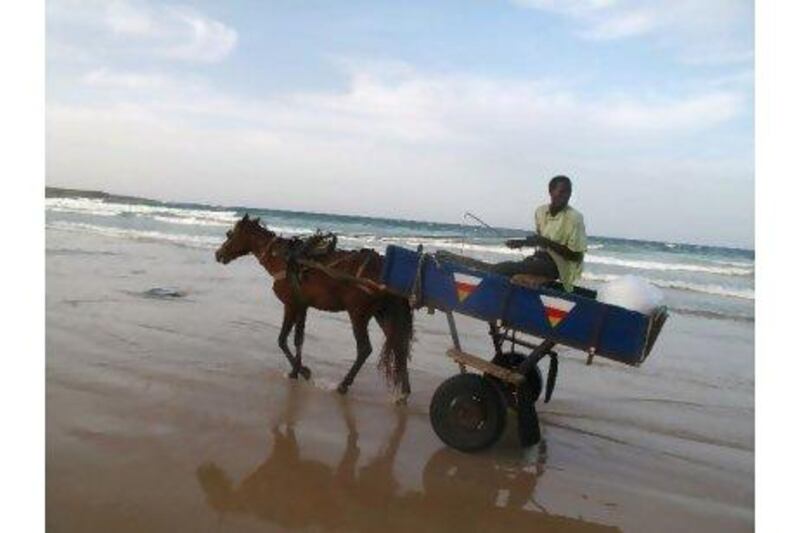Dakar's a village in some respects - at least, it feels that way during my stay. People look at me oddly when I say this. The Senegalese capital sprawls across the westernmost cape of Africa with 2.5 million people in its metropolitan area, each of them, more often than not, covered with a fine layer of urban dust blown about constantly by the Atlantic breeze.
It gets "claustrophobic" during the summer when the air comes to a standstill, says Peter Kahler, a Liberian expat and the general manager of West Africa Democracy Radio. We're going for a stroll around the vehicle-free Gorée Island, a former slave depot and one of Dakar's main tourist sites. "This is the place people come to escape," says Peter.
Peter leaves me on the island in the afternoon to enjoy a local music and dance festival. Following a group of Cape Verdean dancers shaking themselves in frenetic Brazilian style, I run into Florence, from the French island of Réunion, whom I'd met at an expat party the night before. We try to stick together in the crowd but a man in a clean-pressed shirt keeps cutting his way between us.
"That man was being strange and creepy," I tell Florence after I've forced my way between him and his friend to catch up. I stop short to feel my pockets. "He also just stole my wallet."
Breaking free from the crowd, I look around for the man and his friend, but of course he's gone, along with both my bank cards and a hoard of cash. I try not to freak out but, needless to say, this is mighty inconvenient. Perhaps it's some ancestral karma for the white man's role in the slave trade.
Although it seems a pointless formality, we report the theft at the nearby police station.
"Did you see what he looked like?" asks an officer.
I reply, with Florence translating into French, that I recall a well-dressed man in a dark, buttoned-up short-sleeve shirt with vertical stripes. The picture is hazy at best. The chief and I head out into the crowd in a vain attempt to spot a man whose face I don't remember and who has obviously changed his shirt by now. We give up after less than 10 minutes.
On the way back to the station house, we find the first officer dragging a rough-looking man with one arm.In the other hand he held something small, black and made of leather. I can barely get the words out. "My wallet!"
The officer handcuffs the suspect, shoves him towards the station and lays an audible blow to his back with his truncheon. Inside, the other officers take turns beating him.
Amazingly, the cash and bank cards are still in my wallet. The officers, meanwhile, go through a bag they've found on the men - there were three suspects working together, apparently - and find a dark, button-up short-sleeve shirt with vertical stripes.
Another round of beating commences. Truth be told, I have no deep feelings about this rough justice. I murmur to Florence at one point, in English, that they can stop beating the criminals now, but honestly, she isn't meant to translate it, and she doesn't.
It's a lucky break, and I have a good story that night when I meet up with a separate crowd of European expats. They invite me to sleep at the house they've rented for the night on the island; one of them, a UN lawyer, also invites me to stay for a few nights in the spare room in her flat. It's a haven of calm with a huge terrace within a stone's toss from the Atlantic waves - a boon for the weary traveller after my 66-hour journey from Marrakech.
Something about this entire episode sums up my 10-day Dakar experience. An oasis of political stability and freedom in West Africa - there's a reason Peter's radio station is based here, for instance, and not Monrovia - Dakar is eminently liveable. Its night life is legendary, especially if you find a good live performance, although I did not; yet there's also an undercurrent of aggression that residents told me you don't find elsewhere in the region. The Senegalese are famously tough negotiators, for instance, and simply agreeing on cab fare can be a taxing experience. It's not a gentle place.
In fairness, my next encounter with African law enforcement takes place over the border in Mali, and it doesn't go as well for me. At midnight on the road to Bamako, the police try to shake me down for relieving myself next to the official police latrine. I holler loud enough that the bus driver and his assistant come to rescue me. The cops let me off with a US$6 (Dh22) "fine".
My fellow passengers laugh uproariously at the story. Briefly shaken, I feel safe and sound once more, and more importantly, I'm back on the road again, Bamako-bound.
Scott MacMillan is blogging about his journey on his website, www.wanderingsavage.com





